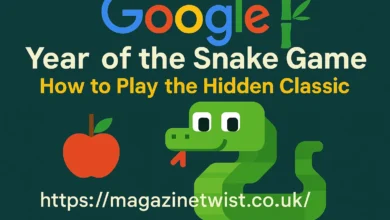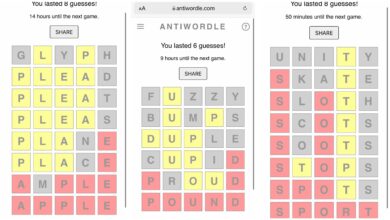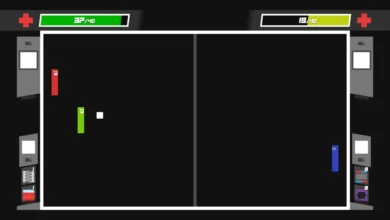What Is Antiwordle? The Reverse Word Game Everyone’s Talking About
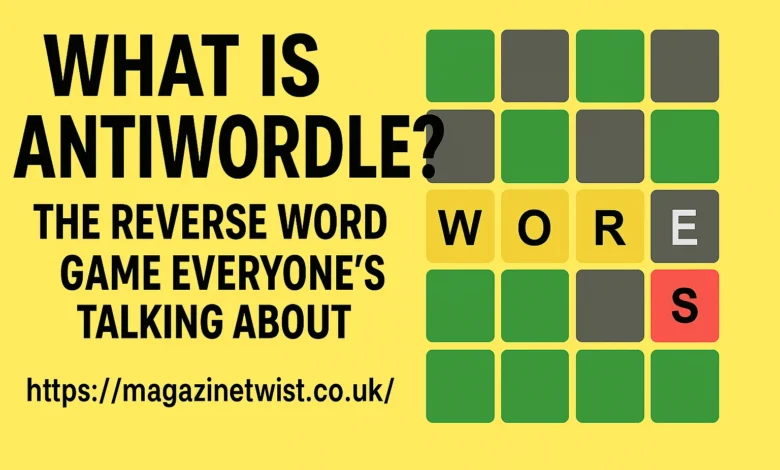
Antiwordle In the vast and rapidly evolving world of word games, It has emerged as a unique and intriguing twist on the classic format. Instead of racing to discover a five-letter word, the goal here is to avoid guessing the correct word for as long as possible. This flip of the familiar ruleset has captured the attention of word-game enthusiasts seeking a fresh, mentally stimulating challenge. In this article, we’ll explore everything from its origins and gameplay mechanics to expert strategies, comparisons, and why this game is gaining traction online.
The Origins of Antiwordle — A Clever Inversion of a Viral Format

Antiwordle first appeared in 2022, created by indie developer Joel Beer, known for projects like Will Code For Beer. Inspired by the skyrocketing popularity of it Beer sought to engineer a game that played with expectations and encouraged players to build a strategy around staying wrong instead of being first to guess correctly. It emerged amid a wave of experimental word games built on mechanics—spawning offshoots like it—but added its twist: the longer you avoid the correct word, the better your score.
How Works — Rules and Gameplay Mechanics
It uses the familiar it color-coding, but flips its purpose:
- Gray letters are eliminated—these letters are not in the solution and cannot appear again.
- Yellow letters are present in the word—but in a different position, and must be reused.
- Red letters are correct and locked in place—must be included in all future guesses.
Your goal? Delay discovering the secret word for as many guesses as possible. You have unlimited attempts, and the game ends only when you finally guess the right word.
Why Antiwordle Is So Addictive — The Psychology of Staying Wrong
Unlike it, which triggers a dopamine hit when you guess right early, It rewards persistence and clever misdirection. The thrill comes from sustaining ambiguity—balancing exploration and frustration as your word options narrow. This reverse satisfaction taps into curiosity and competitive desire: each additional guess becomes a badge of strategy and endurance. Many players relish “losing” cleverly, reveling in clever play over swift brute force.
Getting Started: Quick Beginner Tips
When jumping into Antiwordle, certain habits make for better results:
- Start with double-letter words (e.g., “kooky”, “jazzy”). They help eliminate multiple positions quickly.
- Limit vowel usage early (e.g., start with “tuque” or “quaky”), to avoid locking in the core word too fast.
- Don’t panic at yellow: yellow letters must be reused, but not necessarily repositioned.
- Avoid rare letters first—you don’t want to nail a letter with a red too early.
These simple moves let beginners extend games without accidentally solving the word.
Advanced Strategies for Masters
To take your Antiwordle game to the next level, experienced players recommend:
- Reserve vowels—once you’ve filled out most consonants, introducing vowels becomes more logical, reducing elimination risk.
- Anticipate the word mentally, then choose guesses that run perpendicular to that logic.
- Use enforced yellow/red positions deliberately: locking in a red early forces conforming structure, making it easier to dodge the final solve.
- Keep a mental letter pool—track what remains unused, planning future guesses to dodge the eventual word.
These strategies encourage weighing risk against longevity, turning the game into a tactical exercise.
Antiwordle vs. Other Wordle Spins: What Makes It Unique?
Wordle spawned clever clones like Absurdle, which actively avoids giving away letters, and Hatetris, which gives you the worst Tetris piece possible. Antiwordle’s uniqueness lies in allowing players to choose when to “lose”—over time, you intentionally steer toward solving after stretching your path as long as possible.
- Absurdle fights you; Antiwordle lets you self-sabotage for a win.
- Hatetris punishes you; Antiwordle rewards endurance.
- Reverse stalling is a fresh dimension—where staying wrong becomes a badge of honor.
Where and How to Play
Antiwordle is available online across several platforms:
- The original site: antiwordle.com, featuring the daily puzzle.
- Aggregator sites like RocketGames, Rankdle, and Hahagames with instant, free play.
- Mobile-optimized web versions for phones and tablets.
All versions offer daily challenges, usually synced to UTC.
The Community Around
Despite its niche, Antiwordle boasts a dedicated fanbase:
- Players share daily high scores like “lasted 33 guesses” or “hit 50 before solving.”
- Challenges and fun twists: lowest score wins or contrast with friends.
- Social media groups analyze tough puzzles, discuss strategies, and propose daily themes.
This communal engagement underlines how a simple rule reversal can foster a lively, engaged community.
Should You Try Antiwordle? Who It’s For
Antiwordle suits different players depending on their puzzle preference:
- Competitive minds: appreciate teasing your own brain instead of blitzing solutions.
- Word nerds: examine letter frequencies and positioning in detail.
- Casual fans: enjoy daily puzzling with a twist.
- Frustration seekers: savor the tension of near-success without the payoff… repeatedly.
If you’re bored of solving word puzzles fast and crave a challenge that rewards strategy over speed, Antiwordle is a compelling option.
The Future of Antiwordle and Reverse Puzzle Trends
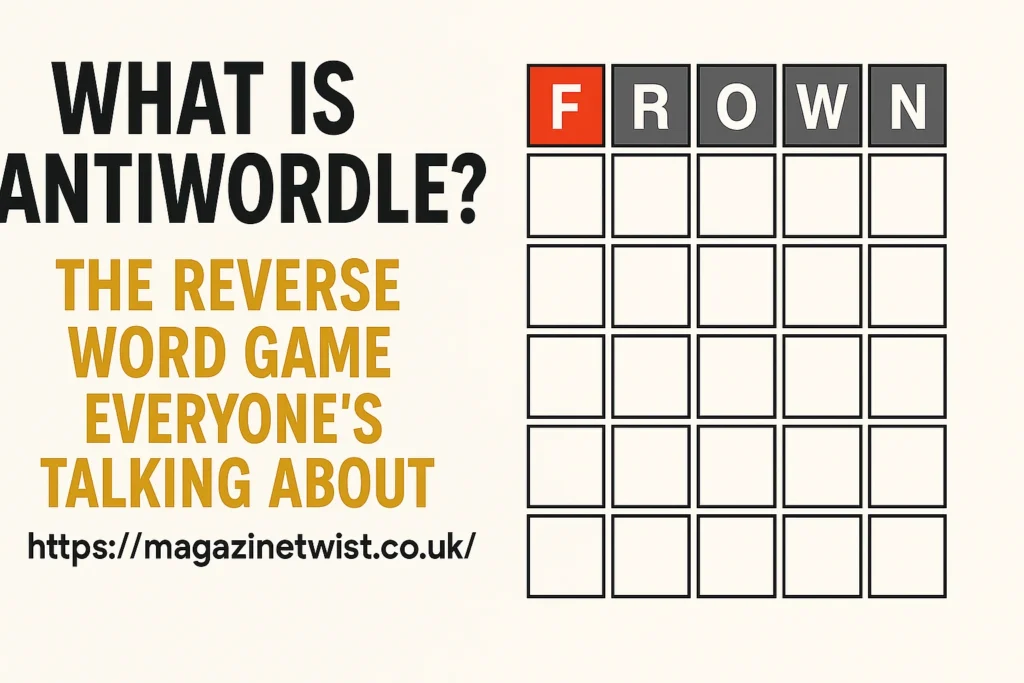
Antiwordle’s success signals a broader appetite for game mechanics that invert expectations. Just as fitness routines include counter-movements, puzzle design is experimenting with reversed incentives. Will we see:
- Variant modes: Antiwordle Hard (limited tries before lose) or timed versions?
- Multiplayer versions: Last man standing in rooms of stalling players?
- Word buckets: themed Antiwordles like Pirate Wordle or Holiday Editions?
Such innovations could propel reverse puzzle formats into mainstream popularity among strategy gamers.
Final Thoughts: Embrace the Thrill of Being Wrong
At its core, Antiwordle revolutionizes the simple joy of guesswork by rewarding endurance, deduction, and strategic failure. The game flips achievement on its head—proving that there’s value in holding back, pausing, and thinking smarter rather than faster. Whether you’re a casual puzzle enthusiast or a Wordle aficionado looking for variety, Antiwordle is a compelling invitation to try being wrong… wonderfully so.
Ready to take on your first reverse word challenge? Head to antiwordle.com, start guessing boldly (or inaccurately), and see just how long you can cleverly stay incorrect.
